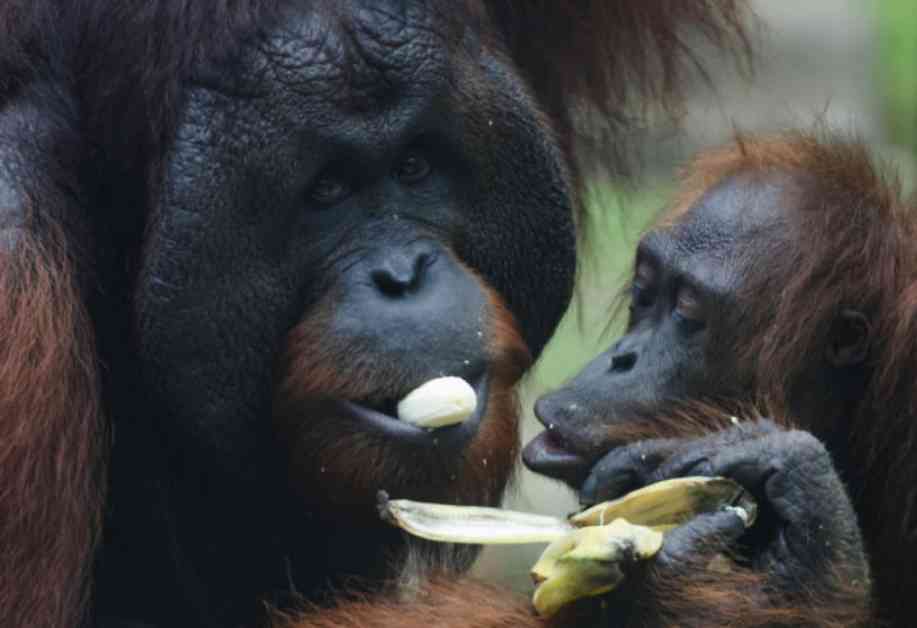**Malaysia’s Adopt-an-Orangutan Plan: A Sustainable Initiative for Palm Oil Importers**
In a bid to address concerns over the impact of palm oil production on orangutans’ habitats, Malaysia has introduced a groundbreaking conservation scheme that allows companies importing palm oil to adopt orangutans. This initiative, spearheaded by Plantations and Commodities Minister Johari Abdul Ghani, aims to protect the critically endangered orangutans while also promoting sustainable practices in the palm oil industry.
**Protecting Malaysia’s Orangutans**
Under the revised version of the conservation scheme, companies that import palm oil from Malaysia will have the opportunity to adopt orangutans, but the animals will not be allowed to leave the country. This decision was made in response to objections raised by conservation groups who expressed concerns about the welfare of the orangutans if they were to be sent abroad as trading gifts.
Minister Johari emphasized the importance of keeping the orangutans in their natural habitats, stating, “The animals cannot leave their natural habitats. We have to keep them here.” By ensuring that the orangutans remain in Malaysia, the government aims to work collaboratively with palm oil importers to protect and preserve the forests where these primates reside.
**Halting Deforestation and Promoting Conservation**
In addition to the adoption program, Minister Johari also pledged to halt deforestation in Malaysia, highlighting the country’s commitment to preserving its natural environment. He stated that 54% of Malaysia’s land is currently forested and pledged that this level would not fall below 50%. This promise underscores Malaysia’s dedication to conservation efforts and sustainable land use practices.
Conservation group WWF has reported that the population of orangutans on the island of Borneo is less than 105,000, making them a critically endangered species. The “orangutan diplomacy” scheme, introduced as a response to the European Union’s import ban on commodities linked to deforestation, aims to address the pressing issues facing orangutan populations in Malaysia.
**Funding Conservation Efforts**
Companies that participate in the adopt-an-orangutan program will contribute funds towards habitat conservation work, including monitoring forested areas where orangutans reside. These funds will be distributed to non-governmental organizations and the Sabah government to support efforts to protect and preserve the orangutans’ natural habitats.
Scientific director of the non-government organization Hutan, Marc Ancrenaz, expressed hope that the funds generated through the adoption program could be used to finance critical conservation work. This may include initiatives such as building corridors between fragmented forests to support viable wildlife populations and ensure the long-term survival of orangutans in Malaysia.
**Promoting Sustainable Palm Oil Practices**
The adoption program not only aims to protect orangutans but also serves as a platform to promote sustainable palm oil practices within the industry. By engaging with companies that import palm oil, Malaysia seeks to encourage responsible sourcing practices that prioritize environmental conservation and animal welfare.
Minister Johari stressed the importance of working together with palm oil importers to ensure the sustainability of the industry while safeguarding orangutan habitats. Through collaborative efforts and ongoing monitoring, Malaysia aims to create a more sustainable future for both the palm oil industry and the orangutans that call the country home.
**Conclusion**
In conclusion, Malaysia’s adopt-an-orangutan plan represents a significant step towards conservation and sustainability in the palm oil industry. By allowing companies to adopt orangutans and contribute to habitat protection efforts, Malaysia is taking proactive measures to safeguard the future of these endangered primates. Through collaboration with stakeholders and a commitment to halting deforestation, Malaysia is setting a positive example for sustainable practices in the palm oil sector. As the adoption program unfolds, it is crucial for all parties involved to prioritize the well-being of orangutans and work towards a future where conservation and commerce can coexist harmoniously.




















